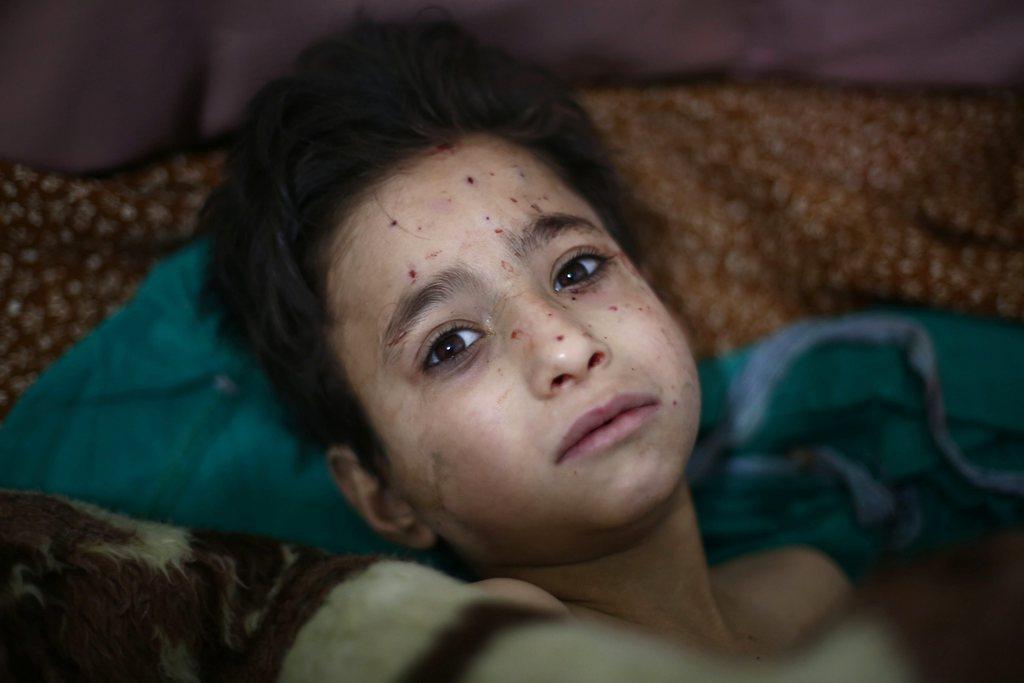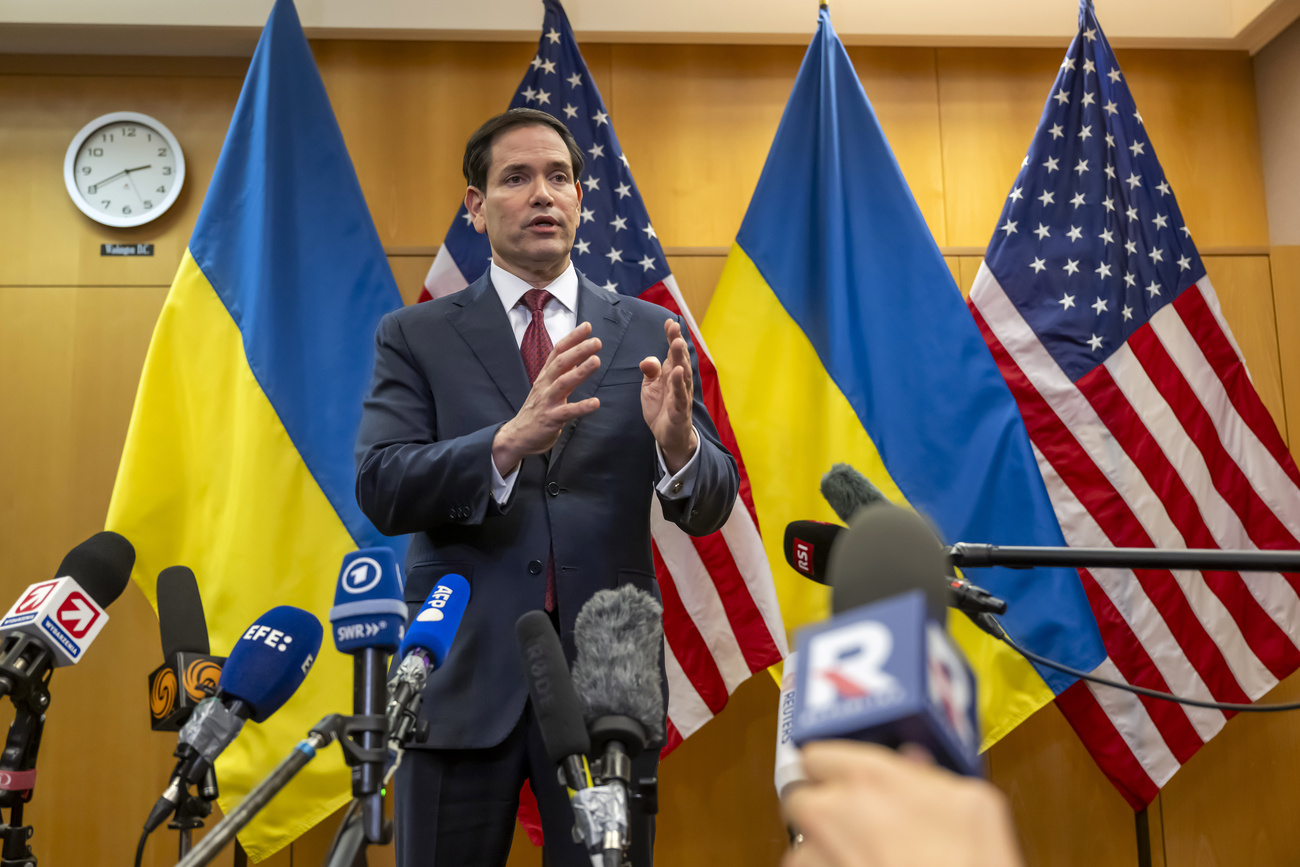
Syria peace talks in Geneva: where are we now?

United Nations-brokered talks aimed at ending Syria’s five-year civil war are getting underway in Geneva on Monday. Here is a short guide to the latest resumption in the so-called Geneva 3 negotiations.
Who is in Geneva for the talks?
Delegations from the Syrian government and the opposition, represented in part by the Saudi-backed High Negotiations Committee (HNC). Staffan de Mistura, a Swedish-Italian diplomat who is the UN special envoy to SyriaExternal link, is the referee.
Russia had urged for Syrian Kurds to take part. De Mistura told Le Temps newspaper on Saturday that while they would not take part, they should be given a chance to express their views.
What are they talking about?
According to De Mistura, an agenda has been set, based on UN Security Council resolution 2254External link. It will focus on the formation of a new transitional government, governance issues, a fresh constitution and UN-monitored presidential and parliamentary elections within 18 months. One of the ideas reportedly receiving serious attention by major powers close to the talks is a possible federal division of Syria.
Separate working groups will also be meeting to discuss progress on the cessation of hostilities and disputes over access to humanitarian aid.
What’s the timetable?
The organisers are aiming for three rounds of indirect “proximity” talks – the parties in separate rooms as the envoy shuttles between them. This first round is not expected to run beyond March 24. After, there will be a break of a week or 10 days to allow them to take stock before they resume.
What are the chances of success?
De Mistura says he expects “substantive, deeper” talks. “Spoilers will try to upset the talks,” he told reporters in Geneva on Monday. “But this is the moment of truth.”
But both sides are showing little sign of compromise over one of the main sticking points: the fate of Syrian President Bashar al-Assad. Western and Gulf Arab governments insist he must go at the end of a transition period. Assad’s backers, Russia and Iran, say Syrians themselves must decide.
Over the weekend, a HNC spokesman said the opposition would discuss the establishment of a transitional governing body in which Assad and his associates would have no role. But Syrian Foreign Minister Walid al-Moallam said any talk of removing Assad during the transitional period was “a red line,” and he would not talk to anyone wanting to discuss the presidency. US Secretary of State John Kerry said Moallam’s comments “clearly tried to disrupt the process” of negotiations.
De Mistura said if the two sides show no willingness to negotiate, Russia, the US and the UN Security Council will again be asked to get involved. “As far as I know the only Plan B is a return to war, and a much worse war than before”.
I’m slightly confused. Didn’t these Geneva 3 talks recently collapse?
The first round was suspended on February 3, 2016 after only two days while still in the ‘preparatory phase’ with both sides blaming each other. It came as government forces, backed by Russian air strikes, launched a major offensive on opposition-controlled areas around the northern city of Aleppo.
De Mistura called for a ‘pause’ and urged countries in the International Syria Support Group, a group of 18 countries and organizations that includes the US and Russia, as well as Turkey, Iran and Saudi Arabia, to do more preparatory work before coming back to the table.
These are the Geneva 3 talks. What went wrong at Geneva 1 and 2?
Geneva 1 talks were held on June 30, 2012. They were initiated by the UN and Arab League Syria envoy Kofi Annan, and attended by the US Secretary of State Hillary Clinton, Russian Foreign Minister Lavrov, a representative of China and British Foreign Secretary William Hague.
The talks produced the “Geneva Communiqué”, which set out the steps needed to stop the fighting and usher in a political transition, but left the question of Assad’s future role unresolved.
Annan resigned after six months after his attempts to broker a ceasefire failed. He accused the UN Security Council of failing to unite behind efforts to end the fighting.
UN-Arab League mediator Lakhdar Brahimi took over on August 2012. He brought the sides together for two rounds of “Geneva 2” talks in February 2014. But the process fell apart within weeks after they disagreed on an agenda and which issue to tackle first: Damascus wanted a focus on fighting terrorism – the term it uses for the rebellion – while the opposition wanted talks on transitional government. Brahimi resigned in May 2014, frustrated by international deadlock.
What’s the situation on the ground in Syria?
A cessation of hostilities, overseen by Russia and the US, came into effect on February 27. Western governments say this has considerably reduced the intensity of the fighting. However, ceasefire violations are regularly reported and fighting persists in some places.
Jan Egeland, de Mistura’s adviser on humanitarian aid, said that since the ceasefire accord, UN and partners have delivered aid to 10 besieged areas, but six important besieged areas, including Daraya and Douma, have not been reached. Opposition groups say not enough aid is getting through.
The fragile ceasefire has offered some hope to ending a war that has cost over 250,000 lives, driven 13.5 million people from their homes, and given an opening to radical groups like the Islamic State and Syria’s al-Qaida branch, the Nusra Front, to seize land. Those groups are not part of the diplomatic efforts.
About 4.7 million Syrians have fled to neighbouring countries (Turkey: 2.7 million; Lebanon: 1 million+; Jordan: 630,000; Iraq: 225,000 and Egypt: 137,000). The UN says about 500,000 people are living under siege in Syria, out of 4.6 million who are in areas hard to reach with aid.

In compliance with the JTI standards
More: SWI swissinfo.ch certified by the Journalism Trust Initiative





























You can find an overview of ongoing debates with our journalists here . Please join us!
If you want to start a conversation about a topic raised in this article or want to report factual errors, email us at english@swissinfo.ch.